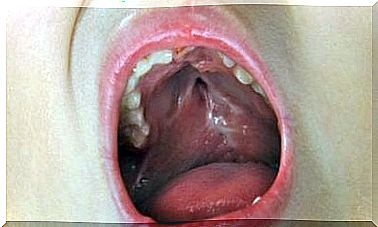Your Baby’s Sixth Month: Introducing Transition Food

Your baby’s sixth month of life is a milestone that marks the beginning of many new experiences. Now your baby is ready to eat some solid food. Their teeth are growing and after some trials they will be able to stand up. Read today’s article and find out what happens in your baby’s sixth month .
This will be an unforgettable time! We guide you in the changes that will take place in this time.
Changes in your baby’s sixth month
Changes can be worrying for first-time mothers. But with some tips and advice, we will find that there is nothing to be afraid of most of the time.
During your baby’s sixth month, you will begin to notice some of the following changes:
Weight and size:
A healthy weight for babies at this age is a wide range. Do not worry if your baby is a little below average.
At the age of six months , most babies weigh between 6-8 kg and their height varies between 63-70 cm.
Movements
One of the most exciting developments happening in this new phase is your baby’s newfound agility. They will start picking up toys, moving them from hand to hand and even throwing with it.
You may also notice that your child is trying to stand on its own by holding on to furniture for support.

Broom
At this stage, most parents look forward to complimenting their children’s diet on various foods. It is a joy to see their expression when they get new taste experiences.
But before you start on the transition food, you should see your child’s doctor so you can find out if this is the right moment to start.
Once you have been given the green light, you are ready to begin this new phase. Your baby will begin to appreciate tastes, textures, and other sensations that stimulate his or her sensory system.
What is the best way to introduce new foods? Fruit purees and mashed vegetables, which are an ideal compliment to breast milk.
Observe your baby’s reaction for the next two days as you try different foods. See if they show any kind of unusual symptoms, which may be a sign of allergy.
The first teeth
The first teeth begin to appear around this time. For some babies, this process can be somewhat uncomfortable. The first teeth to arrive are the lower front teeth, in the middle of their lower jaw.
You need to be patient with your baby during this time. Getting teeth can be a painful and shocking experience.
You will notice it right away when your baby starts getting teeth. They will drool a little more than usual, and they will put everything in their mouths to “scratch” their gums.
They can also be a bit irritable in between and they may even have a fever.
What to give your 6 month old baby to eat
It is without a doubt a good idea to read about healthy eating and find out what foods are best for your baby. Be aware that this is an adaptation phase.
Give your baby some solid food as part of the transition food, but do not stop breastfeeding or giving breast milk substitutes.
- Start with fruits such as banana puree, apple sauce, or peach or pear puree.
- Add some vegetables such as mashed carrot or squash.
- Lentil puree is extremely beneficial, so add them if your baby wants to eat it.
- Give your baby grains such as rice, barley or oatmeal.
- You can also include a bit of yogurt without added sugar.
- Add a few drops of oil when cooking for your baby. Oil contains beneficial fats that help with the development of the nervous system.
- Talk to your doctor first if you would like to experiment with other foods.

Other tips for your baby’s sixth month
We give you some more tips so you can make sure your baby’s sixth month is a wonderful experience:
- Your baby will sometimes make sudden, surprising movements. Do not worry! Just make sure they are out of all kinds of risks. Otherwise, just let them explore and experiment.
- You will soon see your baby try to crawl. Try not to scream or cry – even if it’s for fun! This can scare your baby and then they may not want to try again.
- Do not add salt or sugar to their food until they are one year old. Sugar causes obesity, cavities and many other health problems. Babies are used to the mild taste of milk, and they have not yet acquired a taste for salt.
- Do not include honey in their diet until your doctor says it is okay. Honey may contain botulinum toxin, which causes a condition of the nervous system in some patients.
- It is important to pay attention to your baby’s feces. When you introduce new foods to their diet, it can sometimes lead to constipation.
- Be sure to use suitable cutlery when feeding your child. This way you avoid damaging things and you reduce the risk of injury.
- Do not force your child to eat. Be patient! Your baby will get dirty, play with their food and sometimes spit it out again. They can not eat fast and nicely right away, so give them time!
Most of all, you should enjoy this time with your baby. Before you know it, they will be even bigger and even more independent!









